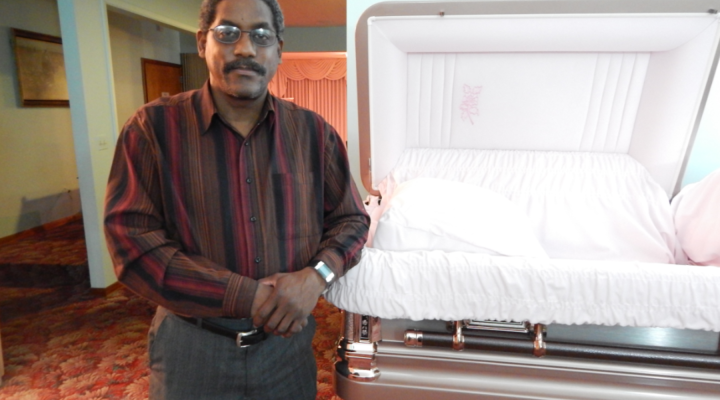
Black-owned funeral homes face existential challenge

The funeral, or “death-care” industry, brings in an estimated $20 billion a year in the U.S., but the industry is changing. There’s been a shift towards chain funeral homes, and more people are choosing cremation. In some U.S. cities, that has black-owned funeral homes particularly worried about staying above ground.
Bowman and Young Funeral Home on the west side of Dayton is straight out of the year it was built, 1963: low ceilings, retro colors. Dwayne Bickham has been working here since he was 17 years old in 1979. He says the area was thriving when he was a kid.
“People in this community had jobs, we had Frigidaire, we had Inland,” he says. Now those factories are long-gone, and a lot of people have left the neighborhood, too.
“The children and grandchildren don’t live in Dayton,” says funeral director Keith Young.
These days, the people shopping for a funeral service could live hundreds of miles away; they’re literally phoning it in from California or Florida or just the suburbs. Or, they’re going online instead of calling the local funeral home they grew up with.
Enter the competition: funeral home chains, which went through a big boom and a spate of buy-outs in the 1990’s, and now seem to be resurgent. They’ve got the internet on lock, and TV ads in prime spots. One chain runs ads in Ohio depicting it as family-owned despite the fact that the owners live in Kansas and have chains across Ohio, including several in Dayton.
Meanwhile, black undertakers are in decline: in one survey of mortician schools, the percentage of black students went from 27 percent seven years ago to just 15 percent in 2014. As the demographics and populations of black neighborhoods have changed, funeral directors have been struggling to adapt.
“They have had to either relocate their business to where some of their clientele has moved, or re-market their business to immigrant families,” says Suzanne Smith, a professor at George Mason University and author of “To Serve the Living: Funeral Directors and the African American Way of Death.”
Young says he’s cut prices and tried to have more of a web presence in response to the competition. And he and some local ministers are trying to convince people to stick with the neighborhood undertaker on principle. He says some of his clients have been surprised by the final price tag at the chains across town.
“People get over there and find out that it’s not what they said it was gonna be. And they come back to the west side of Dayton,” he says. “They come back home.”
African-American funerals are often called homegoings, and Young says he hopes the next generation will keep coming back home for their funerals.
There’s a lot happening in the world. Through it all, Marketplace is here for you.
You rely on Marketplace to break down the world’s events and tell you how it affects you in a fact-based, approachable way. We rely on your financial support to keep making that possible.
Your donation today powers the independent journalism that you rely on. For just $5/month, you can help sustain Marketplace so we can keep reporting on the things that matter to you.


















